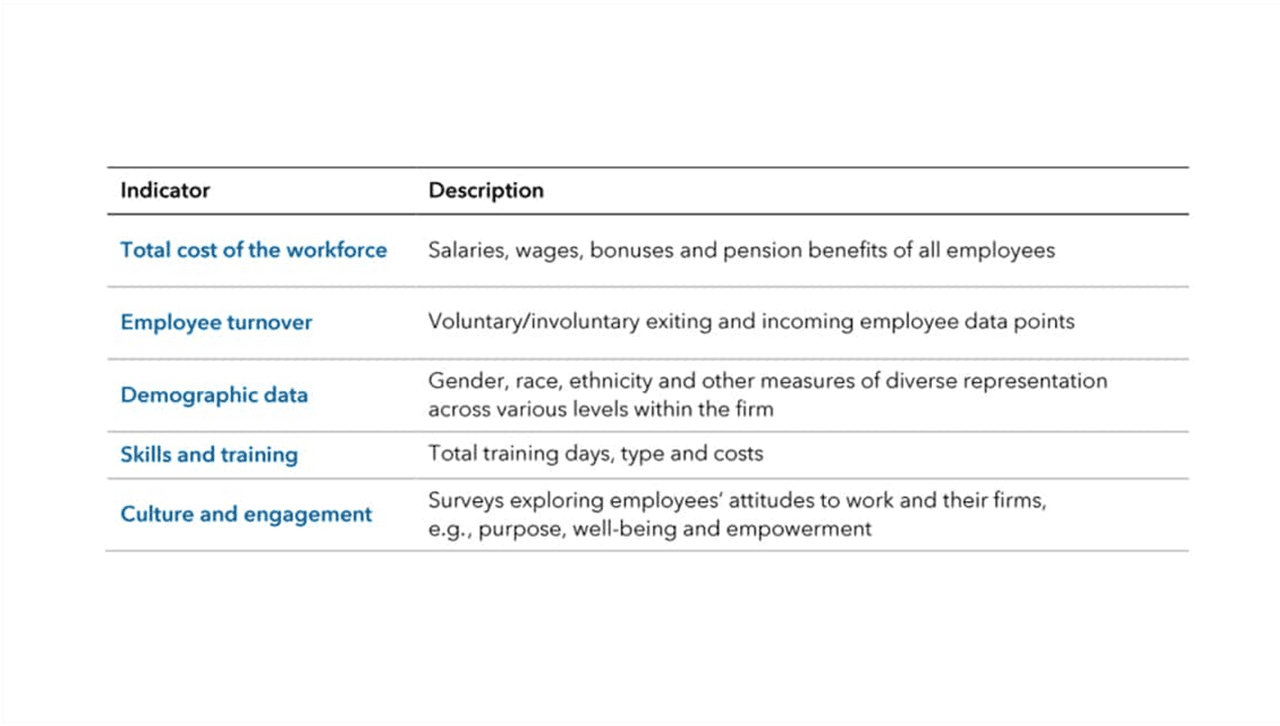Effective human capital management can help boost a company’s financial results in a number of areas. This involves attracting, developing and retaining the right people; supplying the training workers need to take on new skills and technologies; building diverse, innovative, purpose-driven cultures; and finally maintaining positive labor relations, thereby preventing strikes and other stoppages.
Measuring human capital
Five indicators enable companies to effectively measure and report on their human capital management: the total cost of the workforce, employee turnover, demographic data, skills and training, and lastly culture and engagement.

Five indicators enable companies to effectively measure and report on their human capital management Capital Group
These indicators are valuable to investors and can also be reported across all industries and countries. “Quantitative data is critical in differentiating companies and thus understanding risk and opportunity, while qualitative data provides context.”
Interested in learning more? Further data and analysis by Matt Lanstone, Head of ESG Research and Investing at Capital Group, is available
Valuing your human capital
Despite the importance of human capital, very little information is currently disclosed by companies. And this is far from inconsequential, as poor, inconsistent disclosure could mean that human capital is undervalued by the market. Without this disclosure, it is also more difficult to understand elements like minimum wage, median wage and productivity, and to determine the impacts from upward wage pressure or increased competition for talent. Other major reporting gaps are around areas such as diversity, employee turnover and training.
Combating inequality
Several trends underscore the need to value human capital. Low wages, pay gaps and inequality are persistent across many industries and regions, and employees across most industries are pushing for change. Demands include increasing wages and benefits as well as ending racial and gender discrimination. “For example, in January 2021, Google and Alphabet workers formed the Alphabet Workers Union, whose members contribute 1% of their yearly compensation to help compensate individuals for lost wages in the event of a strike.” Given the strain on low- and medium-wage workers throughout the pandemic, the number of work stoppages and strikes may continue to increase.
Prioritizing well-being
The second trend involves changing workplace preferences. Before the coronavirus pandemic, US workers were changing jobs at a rapid pace, with unemployment at record lows. As economies recover and reopen, employers are having trouble hiring. Employees have started looking for benefits beyond decent wages, including work-life balance, health benefits, financial planning benefits and training opportunities. “In 2021, while compensation is still the highest priority for employees, benefits related to health and well-being have become increasingly important. Employees have also reported being more motivated by the opportunity to do purposeful work versus the opportunity to get promoted.”
Benefits related to health and well-being have become increasingly important. Employees have also reported being more motivated by the opportunity to do purposeful work versus the opportunity to get promoted
In this context, company culture is essential to retaining and motivating people, particularly in light of studies showing a link between employee satisfaction and a company’s long-term value.
Focusing on innovation and new skills
With the shift toward digitalization, automation and energy transition, workforces are starting to look dramatically different. “There could be more competition for hiring and attracting employees with skills in areas like cloud computing, big data and e-commerce.” Rather than recruiting new employees with these cutting-edge skills, several companies including Amazon and PwC have opted to invest in training and upskilling their current workers. Other companies have transformed their balance sheets, offloading tangible assets in favor of patents, software, brands and data, all of which are driven and sustained by human innovation.
Most industries will be materially affected by these ongoing human capital trends. Increased human capital disclosures are an opportunity for investors to understand how companies manage people and identify those that can create a competitive advantage.
Interested in finding out more?

